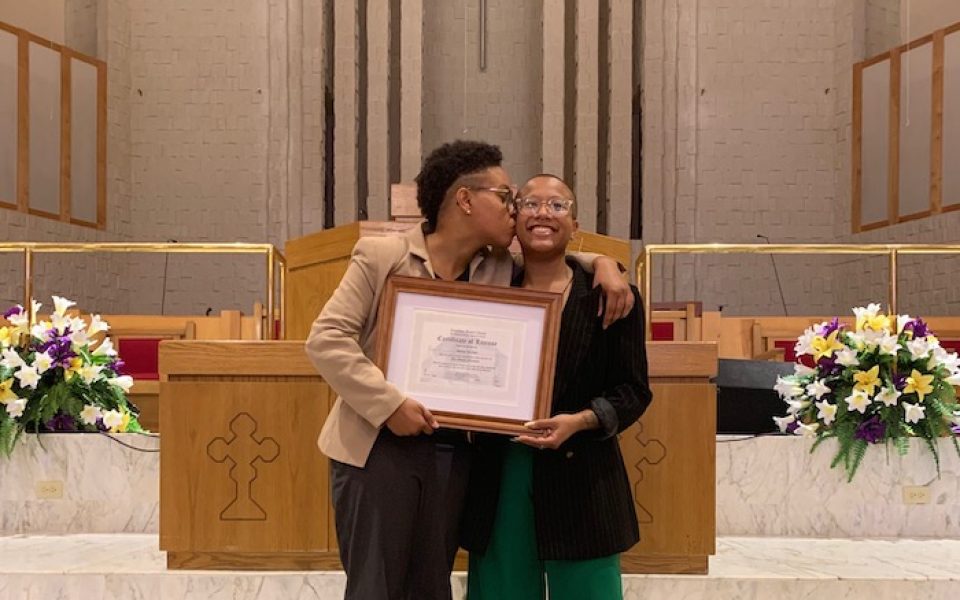Featured image: Chris Livengood with his wife, Jamie, in Ember Audio + Design (courtesy image)
As a child, Chris Livengood would watch his father carefully rifle through his dozens of vinyl records, contemplating each cover, each sleeve, until he found the right portal of sound through which to be transported.
“There wasn’t a day that my father wasn’t pinballing between Pink Floyd and some bombastic organ music,” Livengood says. “The process always seemed so magical to me. It made him seem like a wizard. It had a discreet scholarly quality to it from my perspective.”
Now, Livengood’s own love of vinyl — everything from the sound, to the making of them, to the physical act of owning them (he has hundreds of his own) — is captured in a new documentary called Vinyl Nation.
Livengood co-owns and operates Ember Audio + Design, a hi-fi stereo and modern furniture shop in Winston-Salem, with his wife Jamie. The shop is in its 12th year of operation. The owners of Merge Records in Durham are also featured.

He says he was approached by Kevin Smokler, one of the directors and producers of the doc, to see if he wanted to be involved in the film. Livengood had met Smokler when he was working at AudioVisionSF in San Francisco and they became fast friends, bonded in their love of analog. They kept in touch after the Livengoods moved back to Winston-Salem a few years ago.
“I thought, I don’t normally do that sort of thing but I thought, Why not?” Livengood says.
He says that he decided to be involved in the 92-minute film after hearing what Smokler and Christopher Boone, the other director and producer, wanted to focus on in their doc: the rise and fall of the medium and the new, more inclusive nature of the industry.
The film starts out in Kansas City, Mo., on April 13, 2019 — otherwise known to vinyl fans across the country as Record Store Day. Long lines weave outside of retailers as eager collectors and casual listeners alike wait for doors to open. An annual event since 2008, the day is akin to Christmas or Black Friday for both shoppers and shopkeepers as sales of vinyl fly off the charts this one day out of the year. In 2020, because of the pandemic, the event was postponed and spread out across three dates — Aug. 29, Sept. 26, and Oct. 24. Independent cinemas like A/perture in Winston-Salem began virtual screenings of the film in late August to celebrate the postponed event.

Throughout the film, the stereotyped notion that vinyl and record stores are spaces for old, white men is actively dispelled. We see lines filled with women and children and people of color on Record Store Day, and female store owners are repeatedly interviewed. The film follows a timeline of the rise and fall of the medium from its peak in the eighties with the release of Michael Jackson’s Thriller, to its fall after the invention of CDs, then portable players like the iPod and, finally, the introduction of digital streaming.
But then, something magical happened.
Vinyl saw a resurgence, particularly after independent record stores collaborated to start Record Store Day — bands and labels would produce limited editions and exclusive vinyl pressings that would only be sold during the event. Rising from the ashes of long-forgotten dusty crates, vinyl was reinvigorated, the documentary shows. Soon, large-box retailers like Target, Barnes & Noble and the millennial/Gen Z utopia Urban Outfitters, joined the cause, making vinyl accessible and even hashtag-trendy again. With its revival, the medium found new audiences, particularly younger people and women. The film captures a young college-aged woman’s personal experience with records and how she balances listening to music both on her phone and on her robin’s egg blue Crosley record player that sits on her dresser. A young millennial interracial couple talks about how they bonded over vinyl when they first met.
For Livengood, that sort of messaging is why he decided to get involved with the film.
“It used to be if a woman or person of color walked into a record shop, results may vary,” Livengood says. “But the film is about getting rid of the old guard and letting people who are passionate about music stake out their own territory.”
Livengood, who is in the business of selling accessories for vinyl like sound equipment and furniture, says the same stereotypes existed in his industry, too.
“I spend so much of my time deprogramming my clients about that old-school rhetoric,” he says. “Focusing on how shops are trying to be more inviting, that’s a documentary that hasn’t been made before.”
Since the pandemic hit this spring, Livengood says sales have jumped at Ember. In the first week, he made $6,500 in just gift certificates because people were calling in to help support the business.
“We’re so busy that I don’t sleep,” he says.
In addition to people wanting to support local, Livengood said that a lot of the sales have been driven by people’s desire to enhance their home life while quarantining.
“They want to make their meditative processes at home much richer and more meaningful,” he says.
The category of item that’s sold the most during the pandemic? Turntables.
And that begs the question that Vinyl Nation also explores.
Does vinyl actually sound better than digital?

Many of the people interviewed in the film express varying opinions on the age-old question, but Livengood says he believes it does, but not for the reason people might think.
“In every measure, no,” Livengood admits. “Digital is technically perfect, but in the conversion, some sounds are lost. It’s a dry, obedient, hyper-accurate reproduction.”
He and the filmmakers explain how vinyl is a direct translation of sound into a physical disc. Every ounce of noise from the original recording is captured when it comes to vinyl whereas with digital, it’s cleaned up and sterilized.
“Our brain doesn’t want perfect timing, it doesn’t want crystal-clear,” Livengood says. “Analog brings out randomized distortions that ultimately render a more seemingly pleasing picture of sound…. It just makes people feel like they are more connected to the music in a more kinetic way.”
Rent Vinyl Nation through A/perture cinema at aperturecinema.com/movies/vinyl-nation. Visit Ember Audio + Design at 151 W 9th St. in Winston-Salem from 11 a.m. to 5 p.m. every day except Monday. Appointments preferred. Celebrate Record Store Day on Sept. 26 and Oct. 24 at a local record store near you.
Join the First Amendment Society, a membership that goes directly to funding TCB‘s newsroom.
We believe that reporting can save the world.
The TCB First Amendment Society recognizes the vital role of a free, unfettered press with a bundling of local experiences designed to build community, and unique engagements with our newsroom that will help you understand, and shape, local journalism’s critical role in uplifting the people in our cities.
All revenue goes directly into the newsroom as reporters’ salaries and freelance commissions.





Leave a Reply